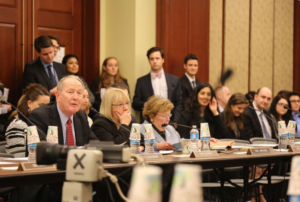
It’s common for interest groups to play on both sides of the political aisle, even if they tend to lean in one direction. But when it comes to recognizing its champions in public life, the nation’s largest teachers union has a long history of favoring Democrats.
That’s why it’s noteworthy that, this month, the National Education Association bestowed its highest honor, the “Friend of Education Award,” on Republican Sen. Lamar Alexander, R-Tenn.
For the NEA, this was a break from the recent past. Education Week reported Alexander is the first Republican to receive the award in more than 30 years. The last was Robert T. Stafford, a Vermont Senator whose policy preferences were notably to the left of today’s GOP. Past honorees have included Jimmy Carter, George McGovern and both Bill and Hillary Clinton, as well as writers Diane Ravitch and Jonathan Kozol.
Alexander, a former U.S. Education Secretary and a longtime supporter of educational choice, shared this year’s award with Sen. Patty Murray, D-WA. (who also received the honor in 2013), for their role in crafting and passing the largest overhaul of federal school accountability policy since No Child Left Behind.
The new law, the Every Student Succeeds Act, has gotten attention for shifting power over education policy away from the federal government and back to the state and local level. It was backed by an alliance between conservatives like Alexander, who favor local control, and traditional public education players like the NEA and the National School Boards Association.
Why were left-leaning labor groups able to align with both their own management and congressional conservatives to back the new law? The reasons boil down to who has power over public education. Congressman Rodney Davis, R-Ill., who visited an NEA reception at last week’s Republican National Convention, offered a concise explanation.
“That was about local control. It wasn’t just about union vs. management,” Davis said, according to Ed Week. “It was about making sure local districts had the control they needed. And frankly, a collective bargaining agreement is the most locally-controlled document we actually could find.”
For all its flaws, No Child Left Behind was once embraced by social-justice liberals and pro-accountability conservatives. Like the A-Plus Plan that predated it in Florida, it aimed to shine a light on the performance not just of public schools, but of the groups within those schools whose needs most often went unmet — black and Hispanic children, those with learning disabilities, those who speak a language other than English at home, those who struggle in key subjects like reading.
Top-down accountability policies amounted to interventions by state and federal governments on behalf of the children and families who have historically lacked power in public education. They were often blunt instruments, but years of data now suggest they did what they intended. They helped spur increases in student achievement, and forced schools to focus on students with the greatest needs.
Political conservatives like Senator Alexander have to contend with a backlash against new standards and assessments, and federal involvement in education policy.
But they’ve also called for redistributing power in new ways, by giving families a say over where their children go to school. Empowering parents with greater choices could prove at least as effective as test-based regulatory accountability at pushing schools to meet the needs of disadvantaged students — as long as parents are empowered with a variety of high quality options and useful information about which education providers will work best for their children.
Teachers unions like the NEA favor returning power to the local level for a different reason, and they have not been as eager to give more power to individual families.
Districts are their centers of power. They’d rather negotiate collective bargaining agreements with a central school board office than have to deal with the full range of schools and providers that parents might select to educate their children if they had the choice. And the unions are more likely to influence a local school board election than to flip a congressional seat or win a governor’s race. That is why, time and again, they find themselves aligned politically with school administrators and district leaders – the very groups that sit across the bargaining table from them when it’s time to negotiate a new labor agreement.
In their hearts, most people who devote their careers and lives to teaching believe their interests align with the parents and the students they serve. But under the old definition of public education, in which local monopolies are tasked with educating everyone in a given geographic area, their organized interests all too often wind up working against those families. We need to embrace a new definition of public education that shifts authority to students and their families, and empowers educators to meet their needs.
Travis Pillow is the editor of redefinED, and Doug Tuthill is the president of Step Up For Students, which publishes this blog.


